Earlier last month, a report coming from the NPD research group showed us Chromebooks were apparently thriving in the US, where according to the latest news they are taking up 35% of all notebook sales.
The numbers cover the first five months of the year, and compared to the same period last year, Chromebooks saw a hefty 250% increase.
But during all this time, Microsoft has been quietly spying from the shadow and it hasn’t been contemplating in vain. Redmond has been bashing Chromebooks in a few acid ads, calling them good for nothing devices.
Microsoft was just trying to mask its insecurities related to these inexpensive, safe and overall decent notebooks, but it was also silently cooking up a strategy of its own.
So the tech giant came up with Windows 8.1 with Bing. Prior to this, Microsoft used to charge laptop and PC makers a licensing fee to ship their devices with the operating system. While this strategy brings in revenue, it also creates a barrier for device makers that want to offer low-end devices.
Eventually, most of them decide to jump into the Chrome OS bandwagon, because the operating system is free for OEM use.
Windows 8.1 with Bing counters the offer, by inviting device producers to use the OS without having to pay a fee in the process.
The Bing-loaded version will help Microsoft in two key areas. First of all, it would help the giant boost the stagnant share of it latest release and extend its Bing ecosystem by bringing more users on board (it includes mail, maps, news, and more).
The first Bingbooks have already been made available for purchase, and funnily enough, they bring to the table specifications almost similar to Chromebooks.
So choosing a lower-end laptop might boil down to a matter of choice. Are you a Chrome OS fan or Windows fan? A trend we have noticed when writing on new Chrombook releases is that our readers would be interested in a device with Chromebook-like insides but running Windows 8.1 instead.
Well, now, such products are available for purchase on the market. For example, the ASUS Vivobook F200MA, which has been spotted online not so long ago.
The laptop arrives with an 11.6-inch HD screen boasting the standard 1366 x 768 pixel resolution and does not have touch capabilities. Inside lies an Intel Celeron N2830 (Bay Trail) dual-core processor clocked at 2.16GHz with burst speeds going as far as 2.41GHz.
The new Vivobook also enjoys the perks of 2GB of RAM, 500GB hard drive at 5400 rmp, USB 3.0, two USB 2.0 ports, HDMI out, VGA, 3.4 audio jack, Gigabit Ethernet port, Wi-Fi, and Bluetooth 4.0.
Basically, everything is exactly the same as on the Hexa Chromebook Pi which got unveiled not so long ago (with the exception that we have 4GB of RAM there).
The Lenovo IdeaPad S20-30 is another laptop that could be mistaken for a good old Chreombook, and ASUS plans a new version of its Transformer Book T100 which will run on Windows 8.1 with Bing and probably sell for a cheaper price.
After bashing Chromebooks in the past, Microsoft seems to have recognized their value and utility. The tech giant has acknowledged these products are a serious threat to it, so it has unleashed some serious competition. Chromebooks be afraid, be very afraid!

 14 DAY TRIAL //
14 DAY TRIAL //